Ready for ‘Pillion’? Watch Dudley Dursley Get Dommed by a Leather Daddy Right Now in ‘Please Baby Please’
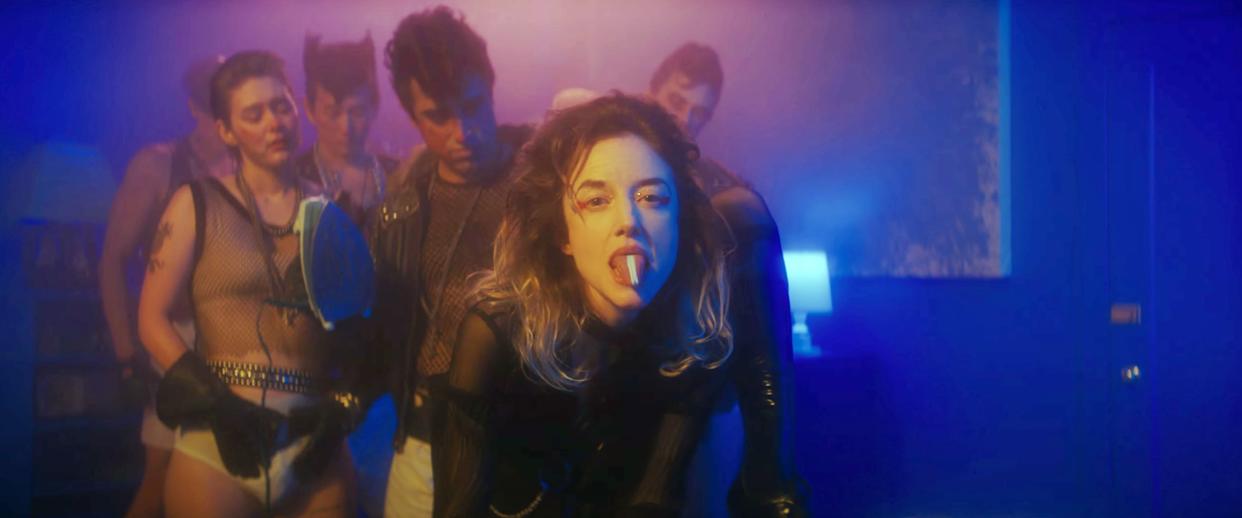

On Friday nights, IndieWire After Dark takes a feature-length beat to honor fringe cinema in the streaming age.
First, the spoiler-free pitch for one editor’s midnight movie pick — something weird and wonderful from any age of film that deserves our memorializing.
More from IndieWire
Then, the spoiler-filled aftermath as experienced by the unwitting editor attacked by this week’s recommendation.
The Pitch: Bikers and Beatniks and Bisexuals, Oh My!
Last month, the internet — or, at the very least, my queer film-obsessed corner of the internet — broke with the announcement of “Pillion,” a romance film starring Harry Melling as a stick-in-the-mud who becomes the submissive boy toy of a leather-clad biker hottie. The prospect of watching Melling, an underrated actor best known for his childhood role of the bratty Dudley Dursley, under the thumb of Alexander Skarsgård in fetish gear is no doubt enticing. But the hubbub over the film also served as a cruel reminder to me that far too many people have gone without seeing “Please Baby Please,” a film released just two years ago that features the erstwhile “Harry Potter” star in a rather similar psychosexual tango.
The sophomore effort of director Amanda Kramer, “Please Baby Please” is a beguiling and oddball project teaming with ideas about sexuality, femininity, masculinity, queerness, love, and partnership. It filters these concerns through a quasi-musical drama set in an expressionistic, neon-hued vision of the ’50s. Think what would happen if you crossed the brooding masculinity of Marlon Brando’s iconic sexpot performance in “The Wild One” with the splendor and emotionality of classic MGM musical “An American in Paris,” and you’ll get a sense of the singular spirit that Kramer conjures up.
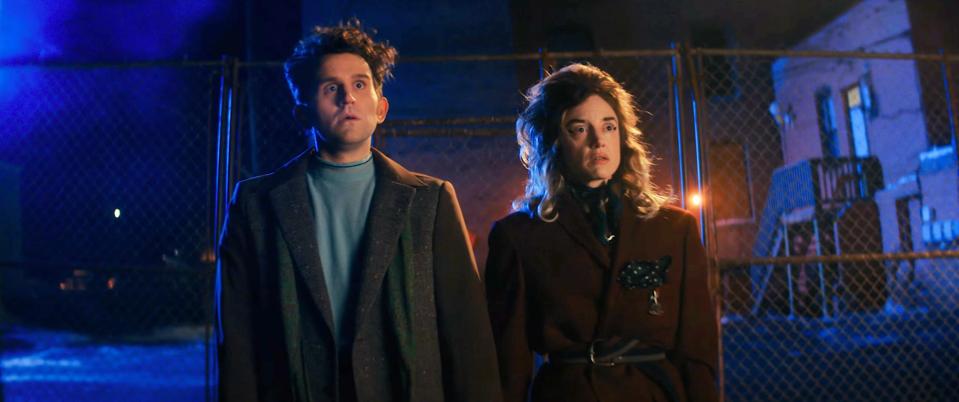
Melling is Arthur, a neurotic, self-loathing type married to the sexually frustrated and significantly more dominant Suze (Andrea Riseborough, a great actress whose mere existence is now a little bit camp after the “To Leslie” of it all). Their rather dull relationship is disrupted in the musical’s opening scene, when outside their apartment they encounter a gang called the Young Gents, led by Teddy (“Love” star Karl Glusman, perfectly cast as the fishnet-top clad object of desire). The group of wild and yet oddly harmless grunts snarl and taunt the pair of beatnik intellectuals, but from first glance, Arthur can barely focus on anything but Teddy’s beautiful eyes and bulging muscles.
This introduction might prime the audience for a queer romance, and “Please Baby Please” isn’t not that. But the film is too keyed into its own idiosyncratic rhythm to offer something quite so conventional. Suze emerges as the lead of the film, which is just as interested in her competing desires to be both independent and to have a man take charge as it is with Arthur’s crisis over his masculinity and sexuality. Littered throughout are a variety of dream dance sequences in which Riseborough is accompanied by men in biker clothing who brand her with an iron. In any other film, these sequences might be the weirdest part, but they’re completely apiece in this homoerotic fable, which flits between monochromatic vignettes with the logic of dreams expressing the bubbling desires of its mismatched couple.
“Please Baby Please” is an imperfect film, often conveying its fascinating story and the emotions of its characters through overly didactic dialogue. But its ambition makes it an endless pleasure to revisit and rewatch, and its perfect cast — from the sweetly nebbish Melling to the go-for-broke Riseborough to the memorable supporting turns from a camp Cole Escola and an ice-cold Demi Moore — bring real sensuality to the fantasia. June is a time to celebrate all the geniuses and weirdos and kinky, dirty sluts that make the queer community so beautiful, and I can’t think of a single movie I’d rather kick off Pride Month with than “Please Baby Please.” —WC
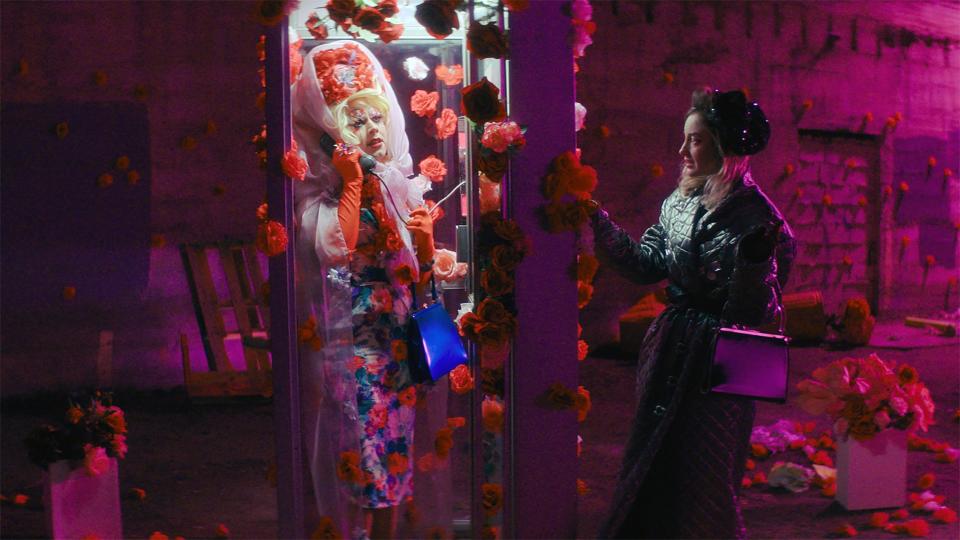
The Aftermath: Violently Taken Identity Never Felt So… Delicate?
Imagine with me a strange planet where inhabitants are arbitrarily split into two opposing groups as dictated by organs they may or may not have. Wait, shit, that’s us.
There’s no soft without hard, no masculine without feminine, and “Please Baby Please” feels like Kramer and co-writer Noel David Taylor’s explosive response to heteronormativity’s petulant obsession with the gender binary. Rooted in a surreal portrait of a more urban suburbia, this gang-centric romance has a gritty texture that sometimes grows too wet with its rain-soaked moodiness but mostly maintains a diaphanous feel that’s otherworldly and wonderfully ostentatious in its queerness. This too quickly forgotten treasure from Kramer, who was new to me, brings to mind “Little Shop of Horrors,” “Blue Velvet,” countless quirky works of John Waters, and (perhaps just because it was Wilson’s last IndieWire After Dark recommendation?) flecks of the sci-fi “Tank Girl” as seen in Riseborough’s titillating and tortured centerpiece performance.
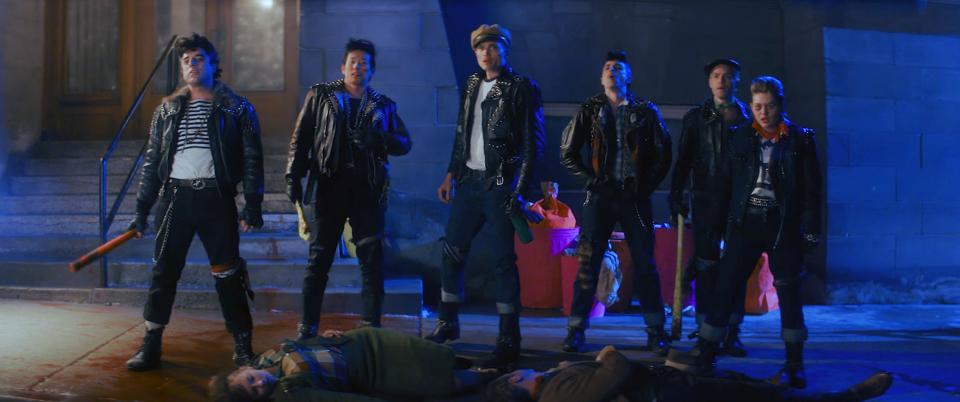
Musicals exist to convey emotions so big you have to sing about them, and this melancholic yet gleefully pervy experiment in evolved affection and dangerous attraction seems to suggest there are some turn-ons so big you have no choice but to let them consume you at scale. (That final fantasy sequence? Bottle it! Sell it in stores!) As seen through the lens of the ’50s, “Please Baby Please” sets up a conservative universe for its characters to rail against through familiar plots of homophobia and self-denial that feel like what might’ve happened if the writers’ room behind “Grease: Rise of the Pink Ladies” got blackout with John Cameron Mitchell. But the script’s dense discussion of the asinine underpinnings of gendered dynamics, heterosexual marriage chief among them, is more complex in its considerations and serves food for thought as much as freak.
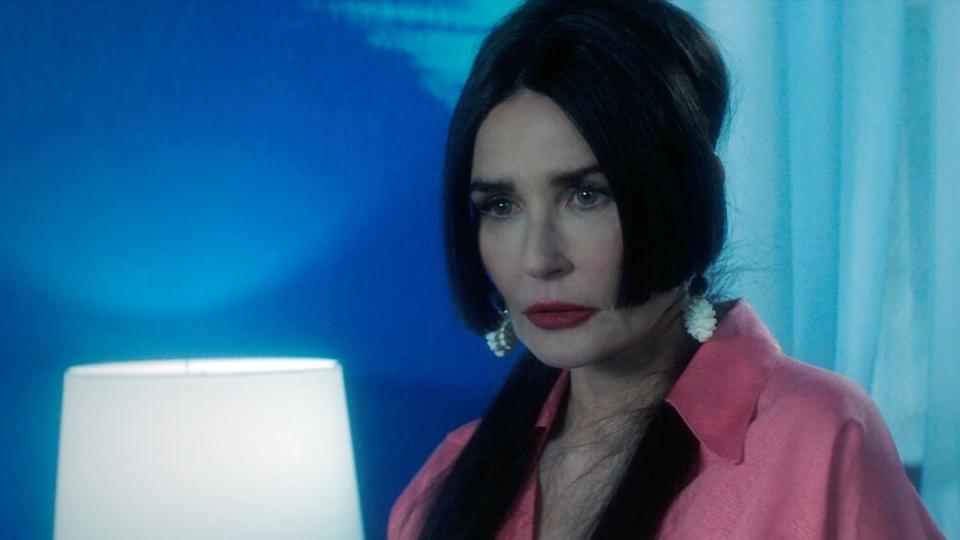
“I’m getting real nervous about the you that you’re becoming.” “There’s playing it cool and there’s just being cool.” “I’m a wife, but I’m no wifey.” That snappy dialogue — lines about self-presentation I don’t want to just quote but emboss on a leather jacket in time for my weekend Pride plans (maybe with a big embroidered flowery telephone booth in the middle?) — bring to mind the metaphoric surface bursts of clarity from characters that are oftentimes murky in their colorfulness. Actions speak louder than words, which is screamingly clear in the unspoken white heat between Arthur and Teddy. (Yeah, good luck beating that one, Mr. Skarsgård.) But Riseborough does wonders with those early Suze monologues, spitting out proclamations of independence like nails, and Melling compliments with a gradually toughened but explicit personal evolution for Arthur underdogs like Roxie’s husband in “Chicago” could learn a thing or two from.
I want a lot out of my midnight movies and I’ll admit I was occasionally disappointed the Young Gents didn’t terrify in the ways I first thought they might. (Neck screwdriver stab was cool, but give me even more!) Still, turning that expectation over in my head, I marveled at Kramer’s delicate directorial touch and wondered if the lasting impression of “Please Baby Please” comes from feeling that you want something more from its nightmarishness but questioning why the dream isn’t enough. —AF
Those brave enough to join in on the fun can stream “Please Baby Please” on Mubi. IndieWire After Dark publishes midnight movie recommendations at 11:59 p.m. ET every Friday. Read more of our deranged suggestions…
‘Sliver’ Is Mandatory Midnight Movie Viewing for Any ‘Basic Instinct’ Fan
Oscar Nominee Tony Curtis Battles an Evil Boil in Bonkers ‘The Manitou’
Long Week? ‘The Voices’ Is the Rare Midnight Movie Better Enjoyed Alone
Best of IndieWire
The 14 Best Thrillers Streaming on Netflix in June, from 'Fair Play' to 'Emily the Criminal'
Unsimulated Sex Scenes in Film: 'Nymphomaniac,' 'The Brown Bunny,' 'Little Ashes,' and More
Every Palme d'Or Winner from the Cannes Film Festival, Ranked
Sign up for Indiewire's Newsletter. For the latest news, follow us on Facebook, Twitter, and Instagram.


